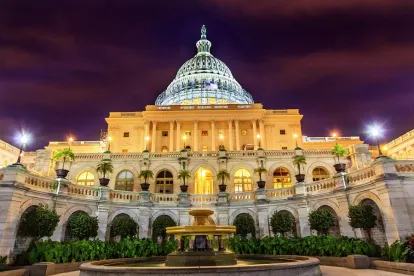Senate Republican leaders have begun to lift the veil on their plans for the next coronavirus response package, acknowledging in a news conference Tuesday that they will support opening the coffers next month to provide another round of aid. The timetable set by Senate Majority Leader Mitch McConnell (R-KY) and other Senate GOP leaders means the Senate will begin action on its COVID-19 response measure a full two months after Democrats in the House of Representatives passed their own legislation, the HEROES Act, as an intended sequel to the bipartisan March 27 CARES Act.
Topics covered today include: tax and economic development, health, international trade, government oversight and US states developments.
More, via POLITICO:
Senate Majority Leader Mitch McConnell on Tuesday gave his clearest signal yet that Republicans are willing to move swiftly on another coronavirus relief package, after some states have seen a spike in cases.
The Kentucky Republican said that the Senate will focus on the next coronavirus package when it returns from the two-week July 4 recess, with the goal of finishing before both chambers depart for their lengthy August break.
That period ‘dovetails nicely with the perfect time, to take an assessment of the economy and the progress we’re making on the health care front and see if there is additional assistance needed for our health care providers,’ McConnell said.
Senator Roy Blunt (R-MO) added that ‘a month from now we should be in the final stages of getting that bill together’ and that talks are starting on a package that will ‘ensure we have more testing, that we continue to work on therapeutics and that we have the money we need to move forward with a vaccine.’
But negotiations are likely to be even more painful in this round of talks, with Republicans and Democrats divided over what to do with billions of dollars in programs that are set to expire at the end of July. One such program — the extra [US$600] per week in jobless benefits — has been a financial lifeline for America’s 44 million unemployed, but the two sides can’t agree whether to renew it. Republicans argue that the program provides a disincentive to return to work.
McConnell said Tuesday that ‘unemployment is extremely important’ but added ‘that is a different issue from whether we ought to pay people a bonus not to go back to work.’”
McConnell has told colleagues the next package should not exceed US$1 trillion and should exclude major new investments in national infrastructure spending. Congressional Democrats, led by House Speaker Nancy Pelosi (D-CA) and Senate Minority Leader Chuck Schumer (D-NY), are in a far different place: by the end of this week, the Democratic-led House will have sent coronavirus response bills totaling more than US$4.5 trillion to the GOP-controlled Senate, and Schumer on Tuesday joined fellow Democrats in rolling out a new proposal to spend nearly US$500 billion more to prepare for US school reopenings this autumn. The contrasting visions mean the two parties will effectively be US$4 trillion apart when they begin talks in July with the aim of agreeing on a proposal that can pass both chambers of Congress and be signed into law by President Donald Trump.
The House continues work today on a sprawling infrastructure bill that accounts for roughly US$1.5 trillion of Democrats’ proposed COVID-19 response. An amendment package authorizing an additional US$20 billion to provide energy upgrades to public buildings was approved yesterday. The White House has signaled that President Trump would veto the measure if it were to reach his desk.
The Senate on Tuesday approved legislation by Senator Ben Cardin (D-MD) extending the CARES Act’s Paycheck Protection Program (PPP) to August 8, Bloomberg reports. The PPP has more than US$100 billion in funds still available to support struggling enterprises. The Senate passed the extension by unanimous consent, sending the measure to the House for consideration.
Tax and Economic Development Updates
Yesterday, Federal Reserve Chairman Jerome Powell and Treasury Secretary Steven Mnuchin testified before the House Financial Services Committee regarding the ongoing US economic recovery efforts in the face of COVID-19. Notably, though, Chairman Powell and Secretary Mnuchin appeared to have different opinions as to how the US economic recovery would take hold. According to Secretary Mnuchin, he expects to see the economy “improve significantly” beginning in the third quarter, though he did acknowledge that certain industries may need additional assistance going forward. Chairman Powell, however, offered a more pessimistic view, suggesting that various challenges to the US economic recovery are still ahead, and made it clear that “[t]he path forward will also depend on the policy actions taken at all levels of government to provide relief and support the recovery for as long as needed.”
To that end, the Senate last night took action to extend that date by which the Small Business Administration (SBA) is authorized to approve PPP loans. However, until the House passes the legislation and it is signed into law by President Trump, the SBA – effective today – is no longer able to approve additional PPP loans from the approximately US$130 billion in funding remaining for the program. Even if the extension is granted, we nevertheless expect continued efforts by lawmakers to pursue legislation that would make reforms to the program to ensure that those businesses most in need of PPP loans are able to access them.
Finally, note that the Internal Revenue Service has issued Notice 2020-52, which clarifies the requirements that apply to a mid-year amendment to a safe harbor 401(k) or 401(m) plan that reduces only contributions made on behalf of highly compensated employees. Additionally, in response to the ongoing COVID-19 pandemic, the notice provides temporary relief from certain requirements that would otherwise apply to a mid-year amendment to a safe harbor 401(k) or 401(m) plan adopted between March 13, 2020, and August 31, 2020, which reduces or suspends safe harbor contributions.
Health Updates
On Tuesday, the Food and Drug Administration (FDA) issued guidance on the development and licensure of a coronavirus vaccine. In a release, FDA Commissioner Stephen Hahn made assurances that the agency would “maintain our regulatory independence and ensure our decisions related to all medical products, including COVID-19 vaccines, are based on science and the available data.” Under the guidelines, a vaccine must be at least 50% more effective than a placebo in preventing the disease or reducing the severity of symptoms in order to receive approval. The document also encourages large-scale and diverse clinical trials and post-marketing surveillance measures. FDA notes that the usage of an Emergency Use Authorization (EUA) will be evaluated on a case-by-case basis.
A dire warning came from the US’ top infectious disease expert on Tuesday. During a Senate Committee on Health, Education, Labor and Pensions hearing on safely returning to work and school, Anthony Fauci, the Director of the National Institute for Allergy and Infectious Diseases, said he “would not be surprised if we go up to 100,000 [cases] a day if this does not turn around” and that he was “very concerned.” Also during the hearing, Centers for Disease Control and Prevention (CDC) Director Robert Redfield encouraged preventative measures to reduce the spread of the virus. He said, “there’s just more and more data showing that the use of face coverings and masks are an effective way to prevent transmission” and “that the practices of keeping distance, wearing masks and washing hands are the best recommendations I can tell you.”
The Department of Health and Human Services (HHS) announced the continuation of partnerships with national pharmacy and grocery retail chains CVS, Rite-Aid, Walgreens, Quest (through services at Walmart) and eTrueNorth to conduct COVID-19 testing. The partnerships utilize a federal bundled payment program paid directly to retailers that receive a flat fee for each test administered. To date, more than 600 of these COVID-19 testing sites in 48 states and the District of Columbia have conducted 750,000 tests.
Additionally, the CDC issued a document titled, “Interim Considerations of Higher Education Administrators for SARS-COV-2 Testing”. Most notably, the CDC does not recommend entry testing of all returning students, faculty, and staff, but rather suggests schools focus on individuals with signs or symptoms of COVID-19, and asymptomatic individuals known or suspected to have been exposed to the virus.
Trade Updates
The US-Mexico-Canada Agreement (USMCA) goes live today, marking the successful entry into force of President Trump’s initiative to update the North American Free Trade Agreement. US officials – led by US Customs and Border Protection (CBP) – are working with stakeholders to address implementation questions and concerns. For further information, please see CBP’s USMCA Implementing Instructions, as updated on June 30 (available here), or contact the United States-Mexico-Canada Center at USMCA@CBP.DHS.gov.
Oversight Updates
During yesterday’s House Financial Services Committee hearing on “Oversight of the Treasury Department’s and Federal Reserve’s Pandemic Response,” Representative Carolyn B. Maloney (D-NY), Chairwoman of the House Committee on Oversight and Reform, pressed Secretary Mnuchin about an “erroneous” legal opinion by the Treasury Department, which raised questions about the scope of the Pandemic Response Accountability Committee’s (PRAC) oversight authority. Chairwoman Maloney urged Secretary Mnuchin to interpret the PRAC’s oversight authorities to apply to all of CARES Act spending, “[n]ot just one half of the CARES Act,” as the administration’s legal opinion suggested. Almost a month ago, PRAC wrote to four congressional committee chairs, including Maloney, to express concern about the administration’s interpretation of the CARES Act that “raise[s] questions about PRAC’s authority to conduct oversight” over the US$1 trillion relief package. At yesterday’s hearing, Secretary Mnuchin said that the legal opinion was “not in bad faith,” and Treasury has “full transparency,” but did not commit to interpreting the PRAC’s oversight authority to include all of the CARES Act spending. He added that, “if the PRAC needs certain information, we will try to do what we can do to accommodate it.”
The Department of Justice, HHS, and the Federal Trade Commission are partnering to alert the public to emerging COVID-19 contact tracing fraud schemes. In alerting the public, HHS Deputy Inspector General for Investigations Gary Cantrell emphasized that “COVID-19 fraud is rapidly evolving. Operating contact tracing schemes is just one method that criminals use to target unsuspecting patients nationwide, attempting to steal their personal information and commit healthcare fraud.” The three agencies are committing to cooperating among themselves and with local law enforcement agencies to identify, prevent, and prosecute those who exploit the public health crisis to enrich themselves.
Yesterday, another person—a Seattle doctor—was charged with PPP-related fraud. According to the criminal complaint, the doctor fraudulently sought over US$3 million in PPP loans by misrepresenting the number of employees, the amount of payroll expenses and by concealing his criminal history. The doctor was charged with one count of wire fraud and one count of bank fraud.
Tomorrow, the House Committee on Oversight and Reform’s Select Subcommittee on the Coronavirus Crisis will hold a hearing on, “The Administration’s Efforts to Procure, Stockpile, and Distribute Critical Supplies.” The hearing will examine the administration’s efforts to procure tests, personal protective equipment, and other medical supplies, as well as the federal government’s plans to coordinate the distribution of supplies to states and local communities and to replenish the Strategic National Stockpile. Three witnesses will testify: Rear Admiral John Polowczyk, Supply Chain Stabilization Task Force; Admiral Brett P. Giroir, M.D., HHS Assistant Secretary; and Kevin Fahey, Assistant Secretary of Defense for Acquisition.
State Updates
Governors from New York (D), Connecticut (D) and New Jersey (D) announced yesterday they have added additional states to their list of eight states announced last week who will be required to quarantine for 14 days after entering their states. This brings the total number of states on the governors’ travel advisory list to 16. States on the list include: Alabama, Arkansas, Arizona, California, Florida, Georgia, Iowa, Idaho, Louisiana, Mississippi, North Carolina, Nevada, South Carolina, Tennessee, Texas and Utah. The quarantine applies to people coming from states with a positive test rate higher than 10 per 100,000 residents on a seven-day average, or with a 10% or higher positivity rate over seven days.
The announcement came as COVID-19 cases are surging in many Sunbelt states, and ahead of the July 4 holiday weekend when summer travel to the governors’ states’ beaches, parks and other attractions typically increase. Enforcement will vary by state. Governor Andrew Cuomo (D) said violators in New York will be subject to mandatory quarantine and face fines from US$2,000 to US$10,000.
Massachusetts Governor Charlie Baker (R) also announced that beginning today, guidance for travelers arriving to the state—including residents returning home to Massachusetts—will require a self-quarantine for 14 days. Essential workers and travelers from the tri-state area and the northeastern states of Connecticut, New York, New Jersey, Maine, New Hampshire, Rhode Island and Vermont are exempt the governor said, due to their states having shown lower positive cases over the past few weeks.
Meg Gilley and Genevieve Bresnahan contributed to this report.







 />i
/>i
